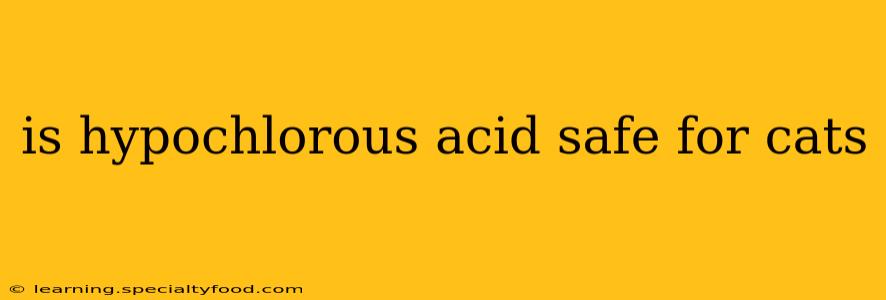Hypochlorous acid (HOCl) is a naturally occurring compound found in the human body's immune system. It's also increasingly used as a disinfectant in various household products. But is this powerful cleaner safe for our feline friends? The short answer is: it's complicated, and largely depends on the concentration and method of application.
While diluted hypochlorous acid solutions are generally considered less harsh than traditional bleach, it's crucial to understand that direct contact with concentrated solutions or ingestion can be extremely harmful to cats. The potential dangers outweigh any perceived benefits of using it directly on your cat.
What is Hypochlorous Acid?
Hypochlorous acid is a weak acid with potent antimicrobial properties. It's effective against a broad spectrum of bacteria, viruses, and fungi. Its popularity stems from its environmentally friendly nature (it breaks down into water and salt) and its generally mild effect on human skin. However, its safety profile differs significantly for animals.
Can I Use Hypochlorous Acid to Clean My Cat's Environment?
This is where things get nuanced. While you shouldn't directly apply hypochlorous acid to your cat, using diluted solutions to clean its environment can be safe, provided you follow crucial precautions.
Here's what you need to consider:
- Concentration: Only use commercially available, pet-safe, diluted hypochlorous acid solutions specifically formulated for cleaning pet environments. Never use concentrated solutions or attempt to dilute them yourself. Improper dilution can lead to dangerous concentrations.
- Thorough rinsing: After cleaning any surface your cat might interact with, rinse it thoroughly with clean water to remove all traces of the solution. Residual hypochlorous acid can still cause irritation or harm if ingested.
- Ventilation: Ensure adequate ventilation during and after cleaning to avoid inhaling any lingering fumes. Cats are more sensitive to airborne irritants than humans.
- Accessibility: Make sure your cat cannot access any surfaces while they are still wet with the cleaning solution.
What Happens if My Cat Ingests Hypochlorous Acid?
Ingestion of hypochlorous acid, even in diluted forms, can cause serious problems for your cat. Symptoms might include:
- Vomiting
- Diarrhea
- Abdominal pain
- Burns in the mouth and esophagus
- Respiratory distress
Immediate veterinary attention is crucial if your cat ingests hypochlorous acid.
Is Hypochlorous Acid Safe for Cleaning Cat Toys?
The same precautions apply to cleaning cat toys. Use a pet-safe, diluted solution and rinse thoroughly before returning the toy to your cat. Always opt for thorough washing with soap and water as the preferred cleaning method for cat toys.
What are Better Alternatives for Cleaning Cat Supplies?
For cleaning your cat's food and water bowls, toys, bedding, and litter boxes, simple soap and water are often the safest and most effective methods. Enzyme cleaners are also a good option for tackling tough odors.
Are there any specific Hypochlorous Acid products safe for cats?
It's essential to check the label of any hypochlorous acid product carefully before use around your cat. Look for products explicitly labeled as "pet-safe" or intended for use in pet environments. Even with a label claiming pet safety, always follow the instructions meticulously, ensuring thorough rinsing.
In conclusion, while diluted hypochlorous acid can be used to clean areas your cat might come into indirect contact with, it should never be used directly on your cat. Always prioritize the use of pet-safe cleaning products and methods to ensure your feline companion's safety and well-being. If you have any doubts, consult your veterinarian for advice on safe cleaning practices for your cat's environment.
